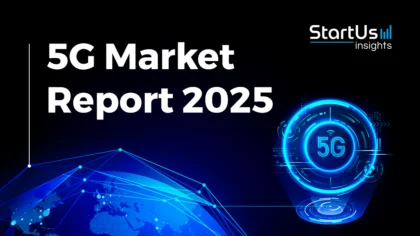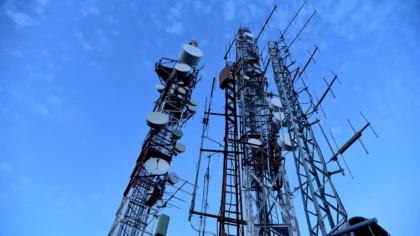Accelerate Productivity in 2025
Reignite Growth Despite the Global Slowdown
The affordability of connected devices and innovation in data-intensive technologies demand highly resilient and fast communication channels for seamless operations. We give you data-driven insights into the top 5G applications based on our analysis of 810 companies & technologies so that you do not miss out on emerging connectivity solutions. Unlike 4G, the fifth generation of cellular connectivity enables ultra-low latency and high bandwidth. As a result, it accommodates more devices than 4G without tower congestion, which otherwise results in denial of service errors. Read more to explore the impact of 5G on 10 industries and how they advance your business.
Tree Map reveals the Top 5G Applications across 10 Industries
Based on the Innovation Map, the Tree Map below illustrates the top 5G use cases across industries in 2023 and 2024. As expected, 5G greatly impacts the telecom and smart city industries due to the need for resilient communication infrastructure. At the same time, smart mobility, grid, and security systems further leverage 5G for efficient operations in cities.
Then, manufacturing, industry 4.0, and energy industries utilize 5G to enhance their Internet of Things (IoT) devices and, in turn, improve process monitoring. FinTech, healthcare, automotive, and rail sectors also rely on the low latency of 5G networks to deliver real-time information across large geographical distances. On the other hand, the retail industry primarily uses 5G to improve customer experience.
Global Startup Heat Map covers 810 5G Startups & Scaleups
The Global Startup Heat Map below highlights the global distribution of the 810 exemplary startups & scaleups that we analyzed for this research. Created through the StartUs Insights Discovery Platform, the Heat Map reveals that the US and UK have a high concentration of 5G startups, followed by other Western European countries, India, and China.
Below, you get to meet 10 out of these 810 promising startups & scaleups as well as the solutions they develop. These 10 startups are hand-picked based on criteria such as founding year, location, funding raised, and more. Depending on your specific needs, your top picks might look entirely different.
Interested to explore all 800+ 5G startups & scaleups?
Top 5G Applications and Use Cases
1. Smart City
Cities and other urban areas rely on communication networks to optimize critical infrastructure like public transport. For example, the recent internet and mobile service blackout throughout Canada hampered banking and emergency services.
That is why startups are offering 5G-driven solutions tailored for city operations. This enables resilient communication channels for critical infrastructure. Consequently, 5G in cities improves smart mobility, traffic management, public safety, and energy efficiency.
FreeFall 5G provides a 5G Antenna System for Cities
FreeFall 5G is a US-based company that offers a 5G antenna system for cities, FreeStar5G. It is a single-unit system that supports an extended mmWave coverage and 360-degree coverage as well as features a modular design.
The system also supports single or multi-user ultra-fast beam switching without phase shifters. It allows governments to accelerate 5G deployment across cities and deliver connectivity to citizens.
2. Telecom
The telecom sector is transitioning to 5G coverage to accommodate the increasing number of devices connected to the internet. However, the capital expenses associated with 5G infrastructure are hindering this shift.
Therefore, startups are developing low-cost private and global 5G connectivity solutions that use the millimeter wave (mmWave) spectrum. This wavelength offers better data transmission speeds and bandwidth than 4G, reducing latency periods of data packets. In turn, 5G improves the performance of data-intensive applications like virtual reality (VR) and advanced data processing.
Picocom develops a 5G System on a Chip (SoC)
Picocom is a UK-based startup that makes PC802, a 5G SoC for telecom companies. It is an NR/LTE PHY small cell that enables 5G standard data transfer and supports fallback to LTE when 5G is not available.
PC802 also features a secure on-chip boot, multi-carrier configurations, dynamic spectrum sharing (DSS), and device monitoring capabilities. This, in turn, allows mobile operators to mitigate in-house 5G processor development and diversify their service offerings.
3. Manufacturing
The manufacturing industry utilizes IoT to improve operations and processes. With the accelerated addition of devices, they could cause tower congestion in current communication networks. Additionally, the high bandwidth requirement for on-premise industrial IoT (IIoT) installations limits their performance.
5G in manufacturing tackles both these issues by increasing transmission speeds. Its high speed minimizes bandwidth requirements and this enables the accommodation of a large number of devices. Since 5G itself leverages a cell-based infrastructure due to its low range, it is ideal for on-premise private network deployment inside production floors.
Cerexio offers a 5G-ready Manufacturing Execution System (MES)
Cerexio is a Singaporean startup that makes a 5G-ready MES. It facilitates 5G network integration and ensures high-speed, high-bandwidth, and low-latency data transfers in industrial setups.
Consequently, the startup’s MES powers high-performing data processing solutions like advanced data analytics, digital twin simulation, and process automation. This provides manufacturers with real-time manufacturing information and, in turn, increases process visibility, allowing them to improve overall equipment effectiveness (OEE).
4. Healthcare
Data-driven healthcare solutions require real-time patient information. That is why low-latency, high-speed connections are necessary to optimize hospital administration and ensure effective patient care. To achieve this, startups are leveraging 5G connectivity.
Additionally, the COVID-19 pandemic is accelerating the adoption of telehealth services and the demand for medical IoT devices. 5G, thus, augments these solutions and improves patient monitoring, engagement, and care delivery. 5G integration further advances robotics and AI in healthcare, enabling remote and personalized healthcare.
SplineAI provides 5G-powered Internet of Medical Things (IoMT) Applications
SplineAI is an Indian startup that offers 5G-powered IoMT applications like intensive care unit (ICU) monitoring. The startup combines 5G, edge computing, and NVIDIA graphics processing units (GPUs) to provide high-performance computing and high speed.
Hospitals use the startup’s solutions to deliver telehealth services more effectively. As a result, SplineAI improves the quality of care, enhances the patient experience, and reduces the cost of care.
5. FinTech
The rate of unsuccessful transactions associated with cashless payments, as well as online and mobile banking, affects customer experiences. Additionally, the current connectivity infrastructure severely bottlenecks crypto transactions and real-time financial data access due to its limited bandwidth.
Leveraging 5G in financial services, on the other hand, allows FinTech service providers to ensure high-speed transactions and speed up cross-border payments. Besides, 5G’s low latency enables faster data processing, which in turn accelerates customer verification, improves data security, and increases lending rates.
Proximity Data Centres offers 5G-ready Edge Data Centers
Proximity Data Centres is a UK-based startup that provides 5G-ready edge data centers for financial services. Using its data storage-as-a-service, companies are able to leverage low-latency and high-speed data transfer on demand.
The startup’s edge data centers also support permanent availability and other data-intensive applications like AI and IoT. These features are critical for the FinTech industry to ensure a seamless experience for their customer as 5G receives more market penetration.

6. Industry 4.0
Industrial automation largely relies on data-intensive technologies like advanced analytics, AI, IIoT, and VR. This demands a highly resilient and high bandwidth connectivity infrastructure. That is why startups are offering 5G solutions optimized for industry 4.0 applications.
For instance, some startups develop end-to-end process automation systems that leverage 5G. This allows manufacturers to enable high-speed IIoT data transfer, provide remote equipment control, and visualize operations in real-time. Consequently, 5G in manufacturing significantly boosts operational efficiency.
X-CITE develops Private 5G IIoT Networks
X-CITE is a Luxembourg-based startup that makes private 5G IIoT networks. The startup combines its connectivity-as-a-service platform, X-CSP, and modular data system, X-BRAiN, to build ultra-reliable low-latency communications (URLLC) networks. The startup also utilizes narrowband (NB) waves to meet the power constraints of IIoT devices.
Further, the startup is integrating 5G network capability into its machine-to-machine (M2M) sim cards, which will enable worldwide connectivity. X-CITE’s solutions, thus, enable industrial plants to leverage real-time data to analyze and optimize operations, reducing failure rates and saving costs.
7. Energy
Distributed energy resource (DER) systems and smart grid management require access to real-time energy generation and load information. 5G supports the necessary communication parameters required to ensure this fast access to connected systems.
As a result, startups are offering 5G-powered energy infrastructure. This, in turn, increases the data processing abilities of the grid and facilitates peer-to-peer (P2P) energy trade. Hence, 5G aids renewable energy integration into the grid through decentralized energy generation and improves demand-side management.
FMC GlobalSat offers 5G Connectivity for Renewable Projects
FMC GlobalSat is a US-based startup that offers a 5G network for renewables and utilities. Its global satellite and hybrid networks provide true broadband and M2M connectivity for energy assets like solar panels, pipelines, and other infrastructures. This includes decentralized systems, CCTVs, and SCADA platforms.
The company’s managed network services also support automatic failover into 5G. This enables energy companies to connect otherwise disconnected and distributed assets for increasing process visibility and production efficiency.
8. Retail
The retail industry leverages 5G to improve customer experience and operations inside stores. It allows retailers to use VR and augmented reality (AR) to engage customers and increase conversion. Besides, in-store customer-centric solutions like smart mirrors require high-speed connectivity to enhance customer experience.
From real-time customer information to personalized product recommendations, 5G assists retailers in all data-driven systems. For example, cloud-based video analytics needs low-latency connectivity to find sales opportunities more effectively.
DeepSight AI Labs deliver Real-Time Video Analytics
DeepSight AI Labs is an Indian startup that offers AI-based real-time video analytics for retail companies. The startup’s solution combines 5G, multi-access edge computing, and AI to transmit critical information in real time.
It allows retailers to secure stores by detecting intrusion, fire, CCTV tampering, and more. Using these features, they are able to prevent breaches, minimize damage and loss, as well as ensure continuity of operations.
9. Automotive
As the automotive industry moves to vehicle-to-everything (V2X) communication and level-5 autonomous driving systems, the current data transfer speeds cause a performance bottleneck. 5G tackles this issue using ultra-low latency and high bandwidth networks.
Even though the range of 5G networks is limited, it is suitable for applications in autonomous systems and connected mobility. Additionally, automotive manufacturers use 5G on their production floors to accommodate high-performing IIoT systems and other data processing solutions.
Tusk IC makes Millimeter Wave (mmWave) Spectrum Chips
Tusk IC is a Belgian startup that creates mmWave spectrum chips for the automotive industry. The startup’s integrated circuits (ICs) support 10GHz to 300GHz+ and it leverages advanced electronic design automation (EDA) tools.
This makes Tusk IC’s design process time-efficient. Additionally, it uses complementary metal-oxide-semiconductor (CMOS), silicon-on insulator (SOI), and silica germanium (SiGe) processes. Tusk IC thus allows automotive manufacturers to mitigate in-house 5G chip development and reduce time-to-market for autonomous vehicles and V2X connectivity.
10. Rail
Similar to automotive, 5G enables train-to-train (T2T) communications in the rail industry. It improves the positioning of trains and, in turn, enables closer spacing between trains, functioning like virtual coupling.
Besides, 5G-enabled IoT in trains enables better traffic forecasts and enhances train movement orchestration, eliminating inefficiencies. 5G also allows rail companies to offer personalized travel experiences to passengers and ensure seamless journeys through contactless ticketing, reward systems, and more.
QuayChain offers 5G-based Rail Carrier Tracking
QuayChain is a US-based startup that enables 5G-based rail carrier tracking. The startup combines edge AI cameras, machine learning, and private LTE/5G networks to offer real-time, accurate trusted milestone and event data.
This allows rail carriers to track equipment in GPS-denied environments and avoid issues associated with GPS battery power. Consequently, it improves supply chain visibility and allows rail companies to tackle inefficiencies.
Discover All 5G Examples
Most startups leverage mmWave to develop private 5G networks for businesses and industries. While this increases the market penetration for 5G, global connectivity is necessary to achieve the full potential of the technology. For this, various startups are developing satellite-based communications to deliver 5G to land, air, and sea, while others reduce the capital expenses associated with 5G infrastructure. These advances will augment the current connectivity infrastructure and enable high-speed communication required for real-time cross-border payments, emergency response, metaverse, and more. Get in touch to identify 5G future applications as well as startups & solutions that advance your business!
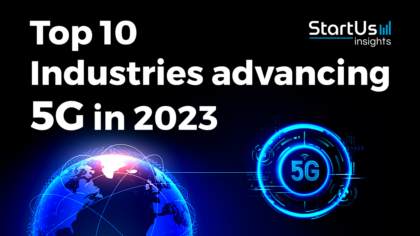
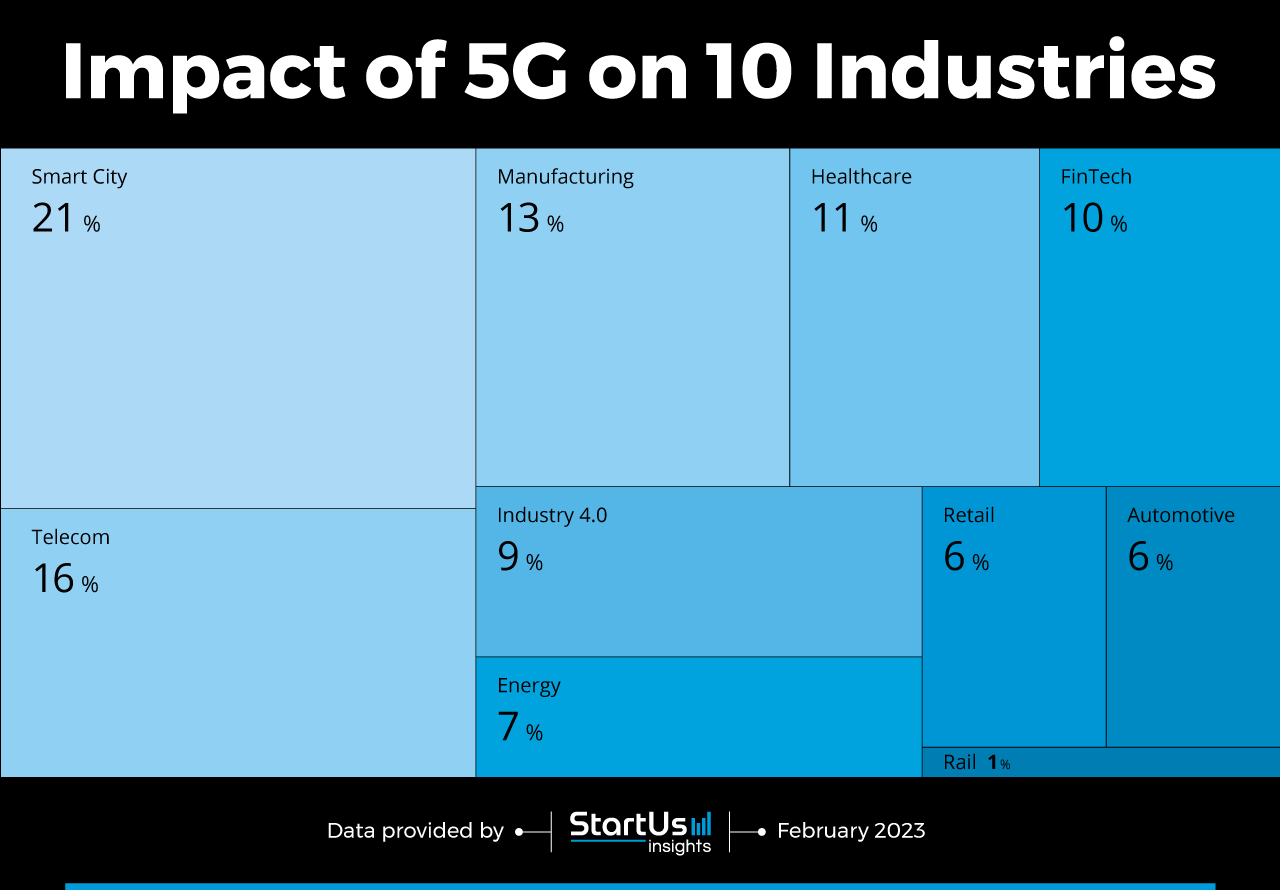
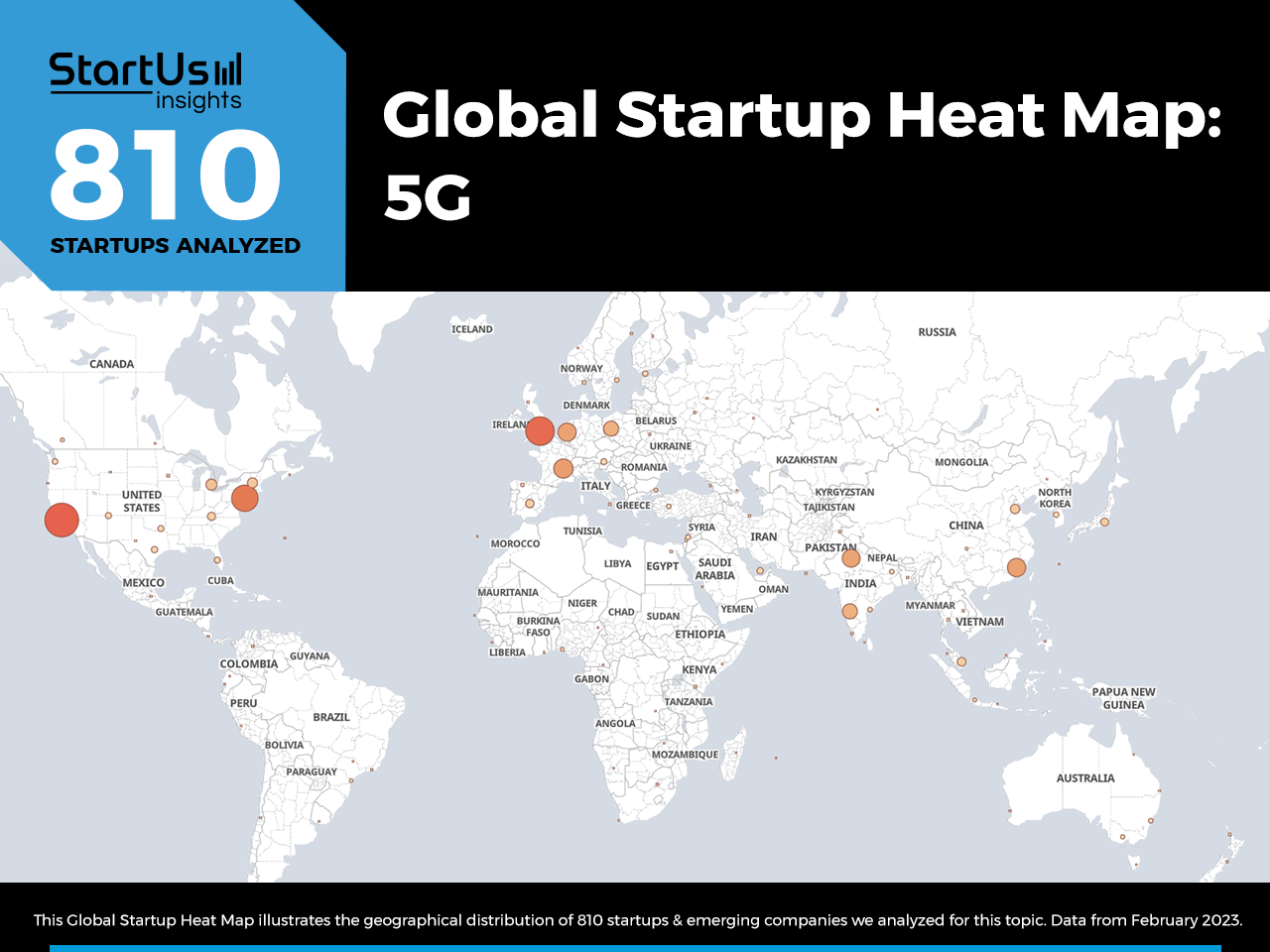
![10 Top AI Solutions for Telecom Operations [2025]](https://www.startus-insights.com/wp-content/uploads/2025/06/AI-Solutions-for-Telecom-Operations-SharedImg-StartUs-Insights-noresize-420x236.webp)
